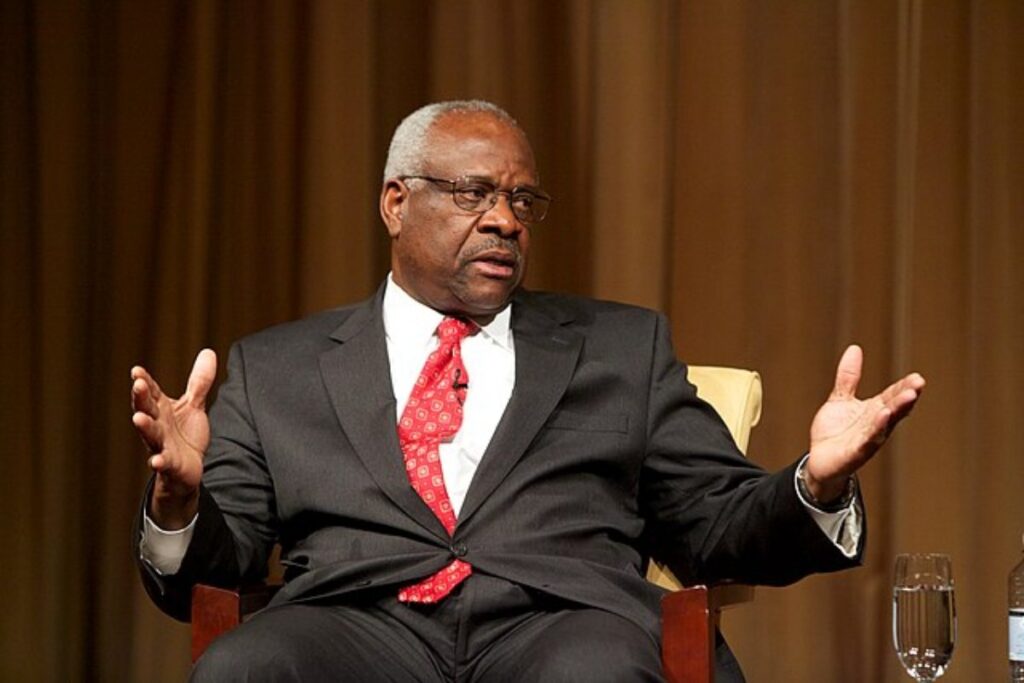A Supreme Court justice has come to criticize a historical ruling. The landmark decision, which just celebrated its 70th anniversary, has had aspects criticized. Justice Clarence Thomas voiced his opinion on the case on Thursday, May 23, 2024.
Clarence Thomas, 75, is an American lawyer and active Supreme Court associate justice. He has served on the Court for over three decades. He was nominated by then-president George Bush and appointed in 1991.
On Thursday, May 23, 2024, the Supreme Court affirmed the court ruling on the congressional voting map. The state legislature designed the South Carolina congressional map to establish voting lines for the state. The voting line has been criticized online as it seems to only negatively affect black voters across the state.
Nine Supreme Court justices voted in favor of upholding the map, resulting in a decision that ended 6-3 against its challenge. Defending the Supreme Court ruling, Justice Samuel Alito Jr. said that he believes the state legislature acted in good faith. The legislators maintained that the lines they drew were not intended to discriminate against anyone, yet they harmed the black community.
ALSO READ: Supreme Court Justice Clarence Thomas to Face Lawsuit for Tax Fraud and Ethics Violations
Despite Alito jr. blind excuse for the decision, the most pathetic excuse came from Justice Clarence Thomas. Thomas said that the Supreme Court went beyond it allocated powers when made the decisions in Brown v. Board of Education.
Brown v. Board of Education is a historic 1954 ruling that ended segregation in schools. The case was led by former Supreme Court Justice Thurgood Marshall, who was a lawyer at the time. Marshall was the first black man to sit on the Supreme Court bench, with his tenure lasting from 1967 to 1991, until Thomas was appointed.
POLL—Should Public Schools Include Critical Race Theory and Sex Education in Their Curriculum?
Thomas wrote that the Supreme Court took an infinite approach to equitable remedies. The Supreme Court, going beyond its assigned powers, claimed that it had given the remedy. Additionally, he asserted that the Supreme Court made a lot of anti-segregation decisions by going beyond its jurisdiction.
Thomas stated that every federal court has powers that are limited based on it jurisdiction to grant equitable remedies. Additionally, he said that no court had the power to create a remedy outside of its judicial powers, regardless of how important the ruling might have been.
The Supreme Court ruling in 1954 ended segregation in schools, allowing black students to integrate into white-only schools. The decision was voted on by the panel in a unanimous decision, which started the civil rights movement that lasted 20 years.
ALSO READ: Supreme Court Justice Clarence Thomas Faces Questions About Friend’s $267,000 RV Loan
However, over the last three decades, there has been an increase in re-segregation as a result of pay disparities between neighborhoods. Civil rights campaigners have long regarded Thomas with suspicion if not outright hatred. They have accused him of rehashing arguments made by segregationists in the service of promoting general ideas about restrained government intervention.
Finally, His coinciding view coincides with criticism he is currently facing after an ethics probe by ProPublica revealed that he concealed expensive travel arrangements paid for by a well-known Republican megadonor.
You might also like:
Kristi Noem Banned Banned From All South Dakota Tribal Land
California Woman Forced to Pay $89K Fine Because Her Son Was Caught Collecting Clams
Pete Buttigieg Slams Lauren Boebert for Taking Credit for a Bill She Voted Against
Former Baltimore State’s Attorney Marilyn Mosby Sets To Forfeit Condo Amid Mortgage Fraud Charges
Texas Lawmakers Halt Melissa Lucio’s Execution After 16 Years of Being on Death Row
